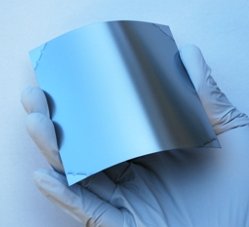Solar company goes small for big results
 Tom Djokovich bought the first external hard drive for his computer just five years ago or so, he said. It was 8 megabytes and cost almost $500. Earlier this week, he saw a 1-terabyte external hard drive on sale for $67.
Tom Djokovich bought the first external hard drive for his computer just five years ago or so, he said. It was 8 megabytes and cost almost $500. Earlier this week, he saw a 1-terabyte external hard drive on sale for $67.
“It was about 100 times bigger and one-eighth of the price,” Djokovich said.
As CEO of XsunX, a California-based solar technology company specializing in thin-film development, he hopes to drive solar energy prices as low as computer technology prices have gone.
And he may be doing it. The company produced thin film cells last week with 15 percent efficiency.
“That’s pretty good,” Djokovich said.
The industry standard for commercially available thin film is about 8 percent efficiency. But Djokovich said thin film doesn’t top out until 30 percent efficiency and some researchers have achieved 20 percent.
“We think we can do even better,” he said.
The secret is one adapted from the computer industry, he said. XsunX has partnered with hard disc drive company Intevac to create monolithic Copper Indium Gallium Selenide cells, or CIGS.
The technology has not seen tremendous success in the marketplace in terms of efficiency. Many producers are able to capture a certain quality in small prototypes that they can’t achieve on larger commercial scales, Djokovich said.
“That’s why we’re not scaling,” he said.
Rather than growing the cells out to the industry standards of several meters, XsunX will produce 5 inch by 5-inch cells, Djokovich said.
His company has determined that the quality of the films is the most important ingredient in creating a highly efficient thin film.
“And when you keep the area small, you can better control the quality,” Djokovich said.
By the end of this year, XsunX expects to begin selling license agreements for its technology to manufacturers. It will continue to do the research and improve the technology and will likely begin working with its licensed companies and train their employees on equipment by the middle of 2011, Djokovich said.
XsunX aims to reduce the cost of its product to about 40 cents a watt, while providing the same efficiency as silicon photovoltaic cells, which typically cost about $1.25 per watt, Djokovich.
“What we really want is to create something that will compete with silicon solar panels,” Djokovich said.



